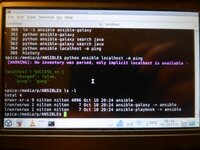We have Python on the Pandora, that means that we can run Ansible on top of it.
You can grab the PND from the repo: http://repo.openpandora.org/?page=detail&app=ansible
2019-10-10 Version: 2.8.5.1 : First upload to the Repo.
2019-11-17 Version: 2.9.0.0 Upgraded Ansible from 2.8.5 to 2.9.0
2019-11-17 Version: 2.9.0.1 Rebuild with precompiled pyc files (Ansible now faster, but still slow)
2019-11-22 Version: 2.9.1.1 Never stick with a dot-Oh release.
At initial run it will create a work/ directory with a .bashrc , ansible.cfg, hosts files which you can tailor to your own needs.
Knowledge of Ansible is required, so
Howto (ansible 2.8.5; not using the PND but directly download from the source website):
https://github.com/ownport/portable-ansible
Enable the Pandora's wifi or enable the network.
Go to a fresh new directory on your SD card and from there:
After a while (many files to unpack) it will create a subdirectory called ansible (64MB) and a few symlinks that change the behavior.
Now time to test it (takes a while to load and return with an answer):
Next is the configuration file, ansible.cfg
This overrides the default host list location (/etc/ansible/hosts) to something you can write.
and now you can create a hosts file, with, for example (assuming you have a few virtual machines with those IP addresses):
note: unable to connect to remote machines (probably need new ssh) → unfixed
Not sure what you can do with it on a Pandora. It is slow (but not by much compared to a dedicated system), but it works
If there is interest, I could make a pnd.

Update: A newer version is available now (v2.8.5): https://github.com/ownport/portable...ad/v0.3.2/portable-ansible-v0.3.2-py2.tar.bz2
If you only have a Windows 10 machine and want to give Ansible a spin: https://www.jeffgeerling.com/blog/2017/using-ansible-through-windows-10s-subsystem-linux
So let's talk about speed: the command "ansible --version" takes 15 seconds. And strangely enough, the PND is 0.05 second faster. (but takes up 10MB more for opening a PND).
You can grab the PND from the repo: http://repo.openpandora.org/?page=detail&app=ansible
2019-10-10 Version: 2.8.5.1 : First upload to the Repo.
2019-11-17 Version: 2.9.0.0 Upgraded Ansible from 2.8.5 to 2.9.0
2019-11-17 Version: 2.9.0.1 Rebuild with precompiled pyc files (Ansible now faster, but still slow)
2019-11-22 Version: 2.9.1.1 Never stick with a dot-Oh release.
At initial run it will create a work/ directory with a .bashrc , ansible.cfg, hosts files which you can tailor to your own needs.
Knowledge of Ansible is required, so
Howto (ansible 2.8.5; not using the PND but directly download from the source website):
https://github.com/ownport/portable-ansible
Enable the Pandora's wifi or enable the network.
Go to a fresh new directory on your SD card and from there:
Code:
wget https://github.com/ownport/portable-ansible/releases/download/v0.3.2/portable-ansible-v0.3.2-py2.tar.bz2 -O ansible.tar.bz2
tar xvf ansible.tar.bz2
for l in config console doc galaxy inventory playbook pull vault;do
ln -s ansible ansible-$l
doneAfter a while (many files to unpack) it will create a subdirectory called ansible (64MB) and a few symlinks that change the behavior.
Now time to test it (takes a while to load and return with an answer):
Code:
python ansible localhost -m ping
python ansible-galaxy search java
python ansible-playbook
python ansible localhost -m setup |headNext is the configuration file, ansible.cfg
Code:
[defaults]
deprecation_warnings=False
inventory=/your/path/to/ansible/hostsThis overrides the default host list location (/etc/ansible/hosts) to something you can write.
and now you can create a hosts file, with, for example (assuming you have a few virtual machines with those IP addresses):
Code:
[web]
192.168.1.[2:5]Not sure what you can do with it on a Pandora. It is slow (but not by much compared to a dedicated system), but it works

Update: A newer version is available now (v2.8.5): https://github.com/ownport/portable...ad/v0.3.2/portable-ansible-v0.3.2-py2.tar.bz2
If you only have a Windows 10 machine and want to give Ansible a spin: https://www.jeffgeerling.com/blog/2017/using-ansible-through-windows-10s-subsystem-linux
So let's talk about speed: the command "ansible --version" takes 15 seconds. And strangely enough, the PND is 0.05 second faster. (but takes up 10MB more for opening a PND).
Last edited:

